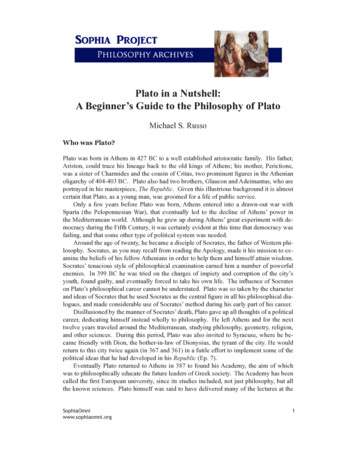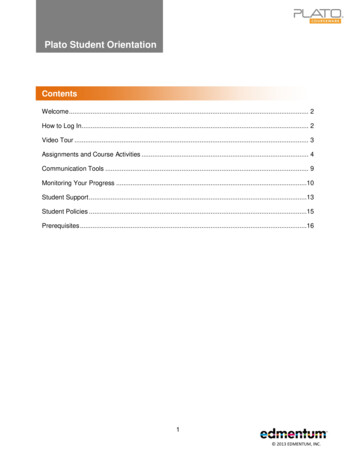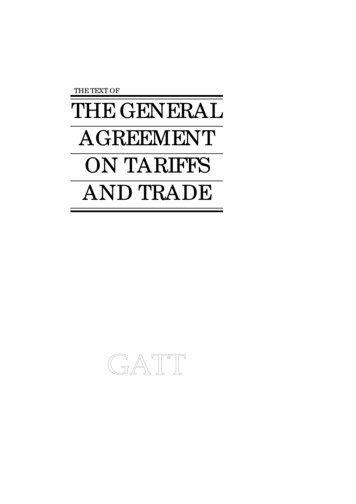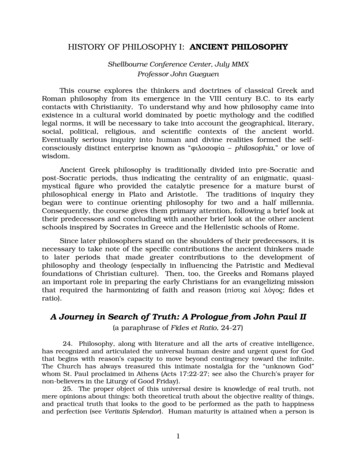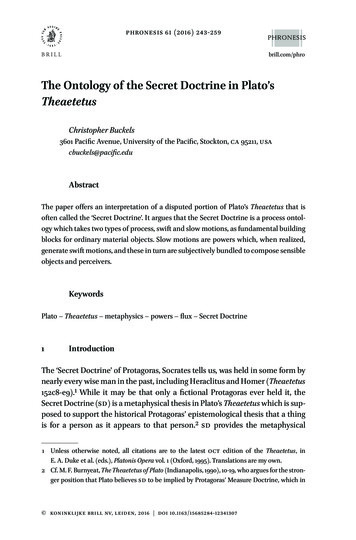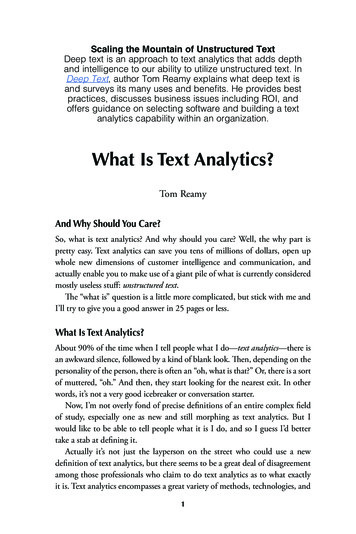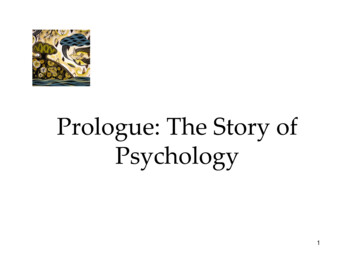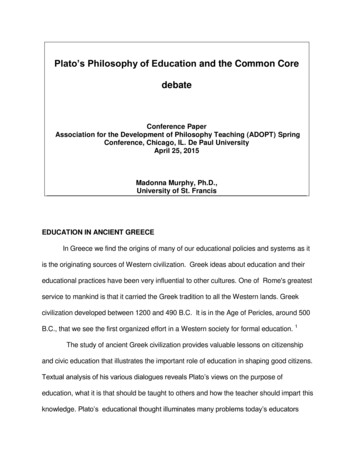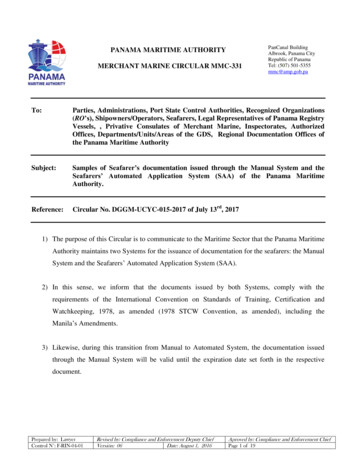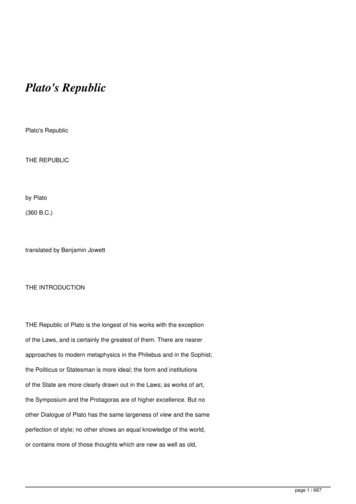
Transcription
Plato's RepublicPlato's RepublicTHE REPUBLICby Plato(360 B.C.)translated by Benjamin JowettTHE INTRODUCTIONTHE Republic of Plato is the longest of his works with the exceptionof the Laws, and is certainly the greatest of them. There are nearerapproaches to modern metaphysics in the Philebus and in the Sophist;the Politicus or Statesman is more ideal; the form and institutionsof the State are more clearly drawn out in the Laws; as works of art,the Symposium and the Protagoras are of higher excellence. But noother Dialogue of Plato has the same largeness of view and the sameperfection of style; no other shows an equal knowledge of the world,or contains more of those thoughts which are new as well as old,page 1 / 687
and not of one age only but of all. Nowhere in Plato is there a deeperirony or a greater wealth of humor or imagery, or more dramatic power.Nor in any other of his writings is the attempt made to interweavelife and speculation, or to connect politics with philosophy.The Republic is the centre around which the other Dialogues maybe grouped; here philosophy reaches the highest point to which ancientthinkers ever attained. Plato among the Greeks, like Bacon amongthe moderns, was the first who conceived a method of knowledge,although neither of them always distinguished the bare outlineor form from the substance of truth; and both of them had to becontent with an abstraction of science which was not yet realized.He was the greatest metaphysical genius whom the world has seen;and in him, more than in any other ancient thinker, the germs of futureknowledge are contained. The sciences of logic and psychology,which have supplied so many instruments of thought to after-ages, are basedupon the analyses of Socrates and Plato. The principles of definition,the law of contradiction, the fallacy of arguing in a circle,the distinction between the essence and accidents of a thing or notion,between means and ends, between causes and conditions; also the divisionof the mind into the rational, concupiscent, and irascible elements,or of pleasures and desires into necessary and unnecessary-these and other great forms of thought are all of them to be foundin the Republic, and were probably first invented by Plato.The greatest of all logical truths, and the one of which writerson philosophy are most apt to lose sight, the difference betweenwords and things, has been most strenuously insisted on by him,although he has not always avoided the confusion of them in hisown writings. But he does not bind up truth in logical formulae,--page 2 / 687
logic is still veiled in metaphysics; and the science which heimagines to "contemplate all truth and all existence" is very unlikethe doctrine of the syllogism which Aristotle claims to havediscovered.Neither must we forget that the Republic is but the third partof a still larger design which was to have included an idealhistory of Athens, as well as a political and physical philosophy.The fragment of the Critias has given birth to a world-famous fiction,second only in importance to the tale of Troy and the legend of Arthur;and is said as a fact to have inspired some of the early navigatorsof the sixteenth century. This mythical tale, of which the subjectwas a history of the wars of the Athenians against the Islandof Atlantis, is supposed to be founded upon an unfinished poemof Solon, to which it would have stood in the same relationas the writings of the logographers to the poems of Homer.It would have told of a struggle for Liberty, intended to representthe conflict of Persia and Hellas. We may judge from the noblecommencement of the Timaeus, from the fragment of the Critias itself,and from the third book of the Laws, in what manner Plato wouldhave treated this high argument. We can only guess why the greatdesign was abandoned; perhaps because Plato became sensible of someincongruity in a fictitious history, or because he had lost hisinterest in it, or because advancing years forbade the completionof it; and we may please ourselves with the fancy that had thisimaginary narrative ever been finished, we should have found Platohimself sympathizing with the struggle for Hellenic independence,page 3 / 687
singing a hymn of triumph over Marathon and Salamis, perhaps makingthe reflection of Herodotus where he contemplates the growthof the Athenian empire--"How brave a thing is freedom of speech,which has made the Athenians so far exceed every other stateof Hellas in greatness!" or, more probably, attributing the victoryto the ancient good order of Athens and to the favor of Apolloand Athene.Again, Plato may be regarded as the "captain" ('arhchegoz') or leaderof a goodly band of followers; for in the Republic is to be foundthe original of Cicero's De Republica, of St. Augustine's Cityof God, of the Utopia of Sir Thomas More, and of the numerousother imaginary States which are framed upon the same model.The extent to which Aristotle or the Aristotelian school were indebtedto him in the Politics has been little recognized, and the recognitionis the more necessary because it is not made by Aristotle himself.The two philosophers had more in common than they were conscious of;and probably some elements of Plato remain still undetected in Aristotle.In English philosophy too, many affinities may be traced, not onlyin the works of the Cambridge Platonists, but in great originalwriters like Berkeley or Coleridge, to Plato and his ideas.That there is a truth higher than experience, of which the mind bearswitness to herself, is a conviction which in our own generation hasbeen enthusiastically asserted, and is perhaps gaining ground.Of the Greek authors who at the Renaissance brought a newlife into the world Plato has had the greatest influence.The Republic of Plato is also the first treatise upon education,page 4 / 687
of which the writings of Milton and Locke, Rousseau, Jean Paul,and Goethe are the legitimate descendants. Like Dante or Bunyan,he has a revelation of another life; like Bacon, he is profoundlyimpressed with the unity of knowledge; in the early Churchhe exercised a real influence on theology, and at the Revivalof Literature on politics. Even the fragments of his words when"repeated at second-hand" have in all ages ravished the heartsof men, who have seen reflected in them their own higher nature.He is the father of idealism in philosophy, in politics,in literature. And many of the latest conceptions of modern thinkersand statesmen, such as the unity of knowledge, the reign of law,and the equality of the sexes, have been anticipated in a dreamby him.ARGUMENTThe argument of the Republic is the search after Justice, the natureof which is first hinted at by Cephalus, the just and blameless old man-then discussed on the basis of proverbial morality by Socratesand Polemarchus--then caricatured by Thrasymachus and partiallyexplained by Socrates--reduced to an abstraction by Glauconand Adeimantus, and having become invisible in the individual reappearsat length in the ideal State which is constructed by Socrates.The first care of the rulers is to be education, of which an outlineis drawn after the old Hellenic model, providing only for an improvedreligion and morality, and more simplicity in music and gymnastic,a manlier strain of poetry, and greater harmony of the individualpage 5 / 687
and the State. We are thus led on to the conception of a higher State,in which "no man calls anything his own," and in which there is neither"marrying nor giving in marriage," and "kings are philosophers"and "philosophers are kings;" and there is another and higher education,intellectual as well as moral and religious, of science as well as of art,and not of youth only but of the whole of life. Such a State ishardly to be realized in this world and would quickly degenerate.To the perfect ideal succeeds the government of the soldierand the lover of honor, this again declining into democracy,and democracy into tyranny, in an imaginary but regular order havingnot much resemblance to the actual facts. When "the wheel has comefull circle" we do not begin again with a new period of human life;but we have passed from the best to the worst, and there we end.The subject is then changed and the old quarrel of poetry andphilosophy which had been more lightly treated in the earlier booksof the Republic is now resumed and fought out to a conclusion.Poetry is discovered to be an imitation thrice removed from the truth,and Homer, as well as the dramatic poets, having been condemnedas an imitator, is sent into banishment along with them.And the idea of the State is supplemented by the revelation of afuture life.The division into books, like all similar divisions, is probably laterthan the age of Plato. The natural divisions are five in number;--( 1)Book I and the first half of Book II down to the paragraph beginning,"I had always admired the genius of Glaucon and Adeimantus,"which is introductory; the first book containing a refutationpage 6 / 687
of the popular and sophistical notions of justice, and concluding,like some of the earlier Dialogues, without arriving at anydefinite result. To this is appended a restatement of the natureof justice according to common opinion, and an answer is demandedto the question--What is justice, stripped of appearances?The second division (2) includes the remainder of the second andthe whole of the third and fourth books, which are mainly occupiedwith the construction of the first State and the first education.The third division (3) consists of the fifth, sixth, and seventh books,in which philosophy rather than justice is the subject of inquiry,and the second State is constructed on principles of communismand ruled by philosophers, and the contemplation of the ideaof good takes the place of the social and political virtues.In the eighth and ninth books (4) the perversions of States and ofthe individuals who correspond to them are reviewed in succession;and the nature of pleasure and the principle of tyranny arefurther analyzed in the individual man. The tenth book (5) isthe conclusion of the whole, in which the relations of philosophyto poetry are finally determined, and the happiness of the citizensin this life, which has now been assured, is crowned by the visionof another.Or a more general division into two parts may be adopted; the first(Books I - IV) containing the description of a State framed generallyin accordance with Hellenic notions of religion and morality,while in the second (Books V - X) the Hellenic State is transformedinto an ideal kingdom of philosophy, of which all other governmentspage 7 / 687
are the perversions. These two points of view are really opposed,and the opposition is only veiled by the genius of Plato.The Republic, like the Phaedrus, is an imperfect whole; the higher lightof philosophy breaks through the regularity of the Hellenic temple,which at last fades away into the heavens. Whether this imperfectionof structure arises from an enlargement of the plan; or from theimperfect reconcilement in the writer's own mind of the strugglingelements of thought which are now first brought together by him;or, perhaps, from the composition of the work at different times-are questions, like the similar question about the Iliad and the Odyssey,which are worth asking, but which cannot have a distinct answer.In the age of Plato there was no regular mode of publication,and an author would have the less scruple in altering or addingto a work which was known only to a few of his friends.There is no absurdity in supposing that he may have laid hislabors aside for a time, or turned from one work to another;and such interruptions would be more likely to occur in the caseof a long than of a short writing. In all attempts to determinethe chronological he order of the Platonic writings on internal evidence,this uncertainty about any single Dialogue being composed at one timeis a disturbing element, which must be admitted to affect longer works,such as the Republic and the Laws, more than shorter ones.But, on the other hand, the seeming discrepancies of the Republicmay only arise out of the discordant elements which the philosopherhas attempted to unite in a single whole, perhaps without beinghimself able to recognize the inconsistency which is obvious to us.For there is a judgment of after ages which few great writers haveever been able to anticipate for themselves. They do not perceivepage 8 / 687
the want of connection in their own writings, or the gaps in theirsystems which are visible enough to those who come after them.In the beginnings of literature and philosophy, amid the firstefforts of thought and language, more inconsistencies occur than now,when the paths of speculation are well worn and the meaning of wordsprecisely defined. For consistency, too, is the growth of time;and some of the greatest creations of the human mind have been wantingin unity. Tried by this test, several of the Platonic Dialogues,according to our modern ideas, appear to be defective, but thedeficiency is no proof that they were composed at different timesor by different hands. And the supposition that the Republic waswritten uninterruptedly and by a continuous effort is in some degreeconfirmed by the numerous references from one part of the workto another.The second title, "Concerning Justice," is not the one bywhich the Republic is quoted, either by Aristotle or generallyin antiquity, and, like the other second titles of the PlatonicDialogues, may therefore be assumed to be of later date.Morgenstern and others have asked whether the definition of justice,which is the professed aim, or the construction of the Stateis the principal argument of the work. The answer is,that the two blend in one, and are two faces of the same truth;for justice is the order of the State, and the State is the visibleembodiment of justice under the conditions of human society.The one is the soul and the other is the body, and the Greek idealof the State, as of the individual, is a fair mind in a fair body.page 9 / 687
In Hegelian phraseology the State is the reality of which justiceis the ideal. Or, described in Christian language, the kingdomof God is within, and yet develops into a Church or external kingdom;"the house not made with hands, eternal in the heavens,"is reduced to the proportions of an earthly building. Or, to usea Platonic image, justice and the State are the warp and the woofwhich run through the whole texture. And when the constitutionof the State is completed, the conception of justice is not dismissed,but reappears under the same or different names throughout the work,both as the inner law of the individual soul, and finallyas the principle of rewards and punishments in another life.The virtues are based on justice, of which common honesty in buyingand selling is the shadow, and justice is based on the idea of good,which is the harmony of the world, and is reflected both inthe institutions of States and in motions of the heavenly bodies.The Timaeus, which takes up the political rather than the ethicalside of the Republic, and is chiefly occupied with hypothesesconcerning the outward world, yet contains many indications thatthe same law is supposed to reign over the State, over nature,and over man.Too much, however, has been made of this question both in ancientand in modern times. There is a stage of criticism in whichall works, whether of nature or of art, are referred to design.Now in ancient writings, and indeed in literature generally,there remains often a large element which was not comprehendedin the original design. For the plan grows under the author's hand;page 10 / 687
new thoughts occur to him in the act of writing; he has not workedout the argument to the end before he begins. The reader who seeksto find some one idea under which the whole may be conceived,must necessarily seize on the vaguest and most general.Thus Stallbaum, who is dissatisfied with the ordinary explanationsof the argument of the Republic, imagines himself to have foundthe true argument "in the representation of human life in a Stateperfected by justice and governed according to the idea of good."There may be some use in such general descriptions, but they canhardly be said to express the design of the writer. The truth is,that we may as well speak of many designs as of one; nor needanything be excluded from the plan of a great work to which the mindis naturally led by the association of ideas, and which does notinterfere with the general purpose. What kind or degree of unityis to be sought after in a building, in the plastic arts, in poetry,in prose, is a problem which has to be determined relatively to thesubject-matter. To Plato himself, the inquiry "what was the intentionof the writer," or "what was the principal argument of the Republic"would have been hardly intelligible, and therefore had better be atonce dismissed.Is not the Republic the vehicle of three or four great truths which,to Plato's own mind, are most naturally represented in the formof the State? Just as in the Jewish prophets the reign of Messiah,or "the day of the Lord," or the suffering Servant or peopleof God, or the "Sun of righteousness with healing in his wings"only convey, to us at least, their great spiritual ideals,page 11 / 687
so through the Greek State Plato reveals to us his own thoughtsabout divine perfection, which is the idea of good--like the sunin the visible world;--about human perfection, which is justice-about education beginning in youth and continuing in later years-about poets and sophists and tyrants who are the false teachersand evil rulers of mankind--about "the world" which is the embodimentof them--about a kingdom which exists nowhere upon earth but islaid up in heaven to be the pattern and rule of human life.No such inspired creation is at unity with itself, any morethan the clouds of heaven when the sun pierces through them.Every shade of light and dark, of truth, and of fiction which isthe veil of truth, is allowable in a work of philosophical imagination.It is not all on the same plane; it easily passes from ideasto myths and fancies, from facts to figures of speech. It is notprose but poetry, at least a great part of it, and ought not to bejudged by the rules of logic or the probabilities of history.The writer is not fashioning his ideas into an artistic whole;they take possession of him and are too much for him.We have no need therefore to discuss whether a State such as Platohas conceived is practicable or not, or whether the outward formor the inward life came first into the mind of the writer.For the practicability of his ideas has nothing to do with their truth;and the highest thoughts to which he attains may be truly said to bearthe greatest "marks of design"--justice more than the external frame-workof the State, the idea of good more than justice. The great scienceof dialectic or the organization of ideas has no real content;but is only a type of the method or spirit in which the higher knowledgeis to be pursued by the spectator of all time and all existence.page 12 / 687
It is in the fifth, sixth, and seventh books that Plato reachesthe "summit of speculation," and these, although they fail to satisfythe requirements of a modern thinker, may therefore be regardedas the most important, as they are also the most original, portions ofthe work.It is not necessary to discuss at length a minor question which hasbeen raised by Boeckh, respecting the imaginary date at whichthe conversation was held (the year 411 B. C. which is proposedby him will do as well as any other); for a writer of fiction,and especially a writer who, like Plato, is notoriously carelessof chronology, only aims at general probability. Whether all the personsmentioned in the Republic could ever have met at any one time isnot a difficulty which would have occurred to an Athenian readingthe work forty years later, or to Plato himself at the time of writing(any more than to Shakespeare respecting one of his own dramas);and need not greatly trouble us now. Yet this may be a question havingno answer "which is still worth asking," because the investigationshows that we can not argue historically from the dates in Plato;it would be useless therefore to waste time in inventing far-fetchedreconcilements of them in order avoid chronological difficulties,such, for example, as the conjecture of C. F. Hermann, that Glauconand Adeimantus are not the brothers but the uncles of Plato,or the fancy of Stallbaum that Plato intentionally left anachronismsindicating the dates at which some of his Dialogues were written.CHARACTERSpage 13 / 687
The principal characters in the Republic are Cephalus,Polemarchus, Thrasymachus, Socrates, Glaucon, and Adeimantus.Cephalus appears in the introduction only, Polemarchus drops atthe end of the first argument, and Thrasymachus is reduced to silenceat the close of the first book. The main discussion is carried onby Socrates, Glaucon, and Adeimantus. Among the company are Lysias(the orator) and Euthydemus, the sons of Cephalus and brothersof Polemarchus, an unknown Charmantides--these are mute auditors;also there is Cleitophon, who once interrupts, where, as in the Dialoguewhich bears his name, he appears as the friend and ally of Thrasymachus.Cephalus, the patriarch of house, has been appropriately engaged inoffering a sacrifice. He is the pattern of an old man who has almostdone with life, and is at peace with himself and with all mankind.He feels that he is drawing nearer to the world below, and seemsto linger around the memory of the past. He is eager that Socratesshould come to visit him, fond of the poetry of the last generation,happy in the consciousness of a well-spent life, glad at havingescaped from the tyranny of youthful lusts. His love of conversation,his affection, his indifference to riches, even his garrulity,are interesting traits of character. He is not one of those who havenothing to say, because their whole mind has been absorbed in making money.Yet he acknowledges that riches have the advantage of placing menabove the temptation to dishonesty or falsehood. The respectfulattention shown to him by Socrates, whose love of conversation,no less than the mission imposed upon him by the Oracle, leads himpage 14 / 687
to ask questions of all men, young and old alike, should also be noted.Who better suited to raise the question of justice than Cephalus,whose life might seem to be the expression of it? The moderationwith which old age is pictured by Cephalus as a very tolerableportion of existence is characteristic, not only of him, but of Greekfeeling generally, and contrasts with the exaggeration of Ciceroin the De Senectute. The evening of life is described by Platoin the most expressive manner, yet with the fewest possible touches.As Cicero remarks (Ep. ad Attic. iv. 16), the aged Cephalus wouldhave been out of place in the discussion which follows, and which hecould neither have understood nor taken part in without a violation ofdramatic propriety.His "son and heir" Polemarchus has the frankness and impetuousnessof youth; he is for detaining Socrates by force in the opening scene,and will not "let him off" on the subject of women and children.Like Cephalus, he is limited in his point of view, and representsthe proverbial stage of morality which has rules of life ratherthan principles; and he quotes Simonides as his father had quoted Pindar.But after this he has no more to say; the answers which hemakes are only elicited from him by the dialectic of Socrates.He has not yet experienced the influence of the Sophists like Glauconand Adeimantus, nor is he sensible of the necessity of refuting them;he belongs to the pre-Socratic or pre-dialectical age.He is incapable of arguing, and is bewildered by Socratesto such a degree that he does not know what he is saying.He is made to admit that justice is a thief, and that the virtuespage 15 / 687
follow the analogy of the arts. From his brother Lysias we learnthat he fell a victim to the Thirty Tyrants, but no allusionis here made to his fate, nor to the circumstance that Cephalusand his family were of Syracusan origin, and had migrated from Thuriito Athens.The "Chalcedonian giant," Thrasymachus, of whom we have already heardin the Phaedrus, is the personification of the Sophists, according toPlato's conception of them, in some of their worst characteristics.He is vain and blustering, refusing to discourse unless heis paid, fond of making an oration, and hoping thereby to escapethe inevitable Socrates; but a mere child in argument, and unableto foresee that the next "move" (to use a Platonic expression)will "shut him up." He has reached the stage of framing general notions,and in this respect is in advance of Cephalus and Polemarchus.But he is incapable of defending them in a discussion,and vainly tries to cover his confusion in banter and insolence.Whether such doctrines as are attributed to him by Plato were reallyheld either by him or by any other Sophist is uncertain; in the infancyof philosophy serious errors about morality might easily grow up-they are certainly put into the mouths of speakers in Thucydides;but we are concerned at present with Plato's description of him,and not with the historical reality. The inequality of the contestadds greatly to the humor of the scene. The pompous and empty Sophistis utterly helpless in the hands of the great master of dialectic,who knows how to touch all the springs of vanity and weakness in him.He is greatly irritated by the irony of Socrates, but his noisypage 16 / 687
and imbecile rage only lays him more and more open to the thrustsof his assailant. His determination to cram down their throats,or put "bodily into their souls" his own words, elicits a cryof horror from Socrates. The state of his temper is quite as worthyof remark as the process of the argument. Nothing is more amusingthan his complete submission when he has been once thoroughly beaten.At first he seems to continue the discussion with reluctance,but soon with apparent good-will, and he even testifies hisinterest at a later stage by one or two occasional remarks.When attacked by Glaucon he is humorously protected by Socrates"as one who has never been his enemy and is now his friend."From Cicero and Quintilian and from Aristotle's Rhetoric we learnthat the Sophist whom Plato has made so ridiculous was a man of notewhose writings were preserved in later ages. The play on his namewhich was made by his contemporary Herodicus, "thou wast ever boldin battle," seems to show that the description of him is not devoid ofverisimilitude.When Thrasymachus has been silenced, the two principal respondents,Glaucon and Adeimantus, appear on the scene: here, as in Greek tragedy,three actors are introduced. At first sight the two sons of Aristonmay seem to wear a family likeness, like the two friends Simmiasand Cebes in the Phaedo. But on a nearer examination of themthe similarity vanishes, and they are seen to be distinct characters.Glaucon is the impetuous youth who can "just never have enough of fechting"(cf. the character of him in Xen. Mem. iii. 6); the man of pleasurewho is acquainted with the mysteries of love; the "juvenis quipage 17 / 687
gaudet canibus," and who improves the breed of animals; the loverof art and music who has all the experiences of youthful life.He is full of quickness and penetration, piercing easily belowthe clumsy platitudes of Thrasymachus to the real difficulty;he turns out to the light the seamy side of human life, and yetdoes not lose faith in the just and true. It is Glaucon who seizeswhat may be termed the ludicrous relation of the philosopherto the world, to whom a state of simplicity is "a city of pigs,"who is always prepared with a jest when the argument offers himan opportunity, and who is ever ready to second the humor of Socratesand to appreciate the ridiculous, whether in the connoisseurs of music,or in the lovers of theatricals, or in the fantastic behavior ofthe citizens of democracy. His weaknesses are several times alludedto by Socrates, who, however, will not allow him to be attackedby his brother Adeimantus. He is a soldier, and, like Adeimantus,has been distinguished at the battle of Megara.The character of Adeimantus is deeper and graver, and the profounderobjections are commonly put into his mouth. Glaucon is more demonstrative,and generally opens the game. Adeimantus pursues the argument further.Glaucon has more of the liveliness and quick sympathy of youth;Adeimantus has the maturer judgment of a grown-up man of the world.In the second book, when Glaucon insists that justice and injusticeshall be considered without regard to their consequences,Adeimantus remarks that they are regarded by mankind in general onlyfor the sake of their consequences; and in a similar vein of reflectionhe urges at the beginning of the fourth book that Socrates fallspage 18 / 687
in making his citizens happy, and is answered that happiness is notthe first but the second thing, not the direct aim but the indirectconsequence of the good government of a State. In the discussionabout religion and mythology, Adeimantus is the respondent, but Glauconbreaks in with a slight jest, and carries on the conversationin a lighter tone about music and gymnastic to the end of the book.It is Adeimantus again who volunteers the criticism of commonsense on the Socratic method of argument, and who refuses to letSocrates pass lightly over the question of women and children.It is Adeimantus who is the respondent in the more argumentative,as Glaucon in the lighter and more imaginative portions of the Dialogue.For example, throughout the greater part of the sixth book, the causesof the corruption of philosophy and the conception of the idea ofgood are discussed with Adeimantus. Then Glaucon resumes his placeof
The division into books, like all similar divisions, is probably later than the age of Plato. The natural divisions are five in number;--( 1) Book I and the first half of Book II down to the paragraph beginning, "I had always admired the genius of Glaucon and Adeimantus," which is introduc
